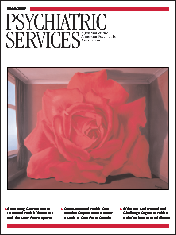Effects of Attributing Serious Mental Illnesses to Genetic Causes on Orientations to Treatment
Abstract
OBJECTIVE: Professional services for persons with serious mental illnesses are underutilized. The genetics revolution has the potential to increase professional help seeking by increasing biomedical interpretations of mental illness among the public. The objective of this study was to assess whether genetic attributions for serious mental illnesses are associated with more positive orientations to professional treatment among members of the general public. METHODS: Data from two nationally representative surveys were analyzed. First, associations between perceptions of genetic causes of both schizophrenia and depression and treatment recommendations and perceived treatment effectiveness were assessed in a vignette study that was part of the 1996 General Social Survey (GSS). Second, the effect of various descriptions of the role of genetic factors in schizophrenia and depression on perceived treatment effectiveness was assessed in a vignette experiment conducted in 2002-2003. RESULTS: Perception of genetic causes was associated with more recommendations for mental hospitalization and prescription medication but not with more recommendations to see a psychiatrist, a therapist, or a general medical practitioner. Perception of genetic causes was not related to perceived treatment effectiveness in the GSS, and genetic causes as described in the vignette were associated with lower perceived effectiveness of treatment. CONCLUSIONS: Increasing emphasis on genetic causes of mental illnesses may have multifaceted effects on orientations to professional treatment. Genetic attributions appear to direct people's help seeking toward the most extreme or biological forms of intervention, possibly because people view genetically influenced disorders as more serious and chronic. At the same time, such attributions lead to pessimism that intervention will be effective.



